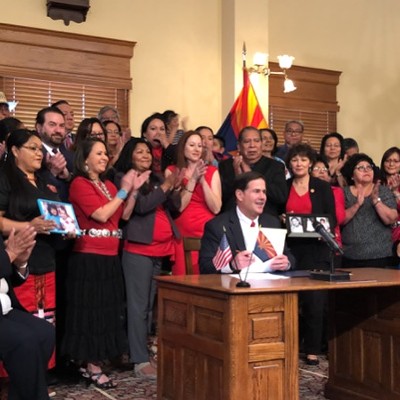Here's what you get out of the whole thing:
LEARNING CURVES
Education came out the big winner of the budget negotiations, with a $160 million increase over the next two years to fund voluntary all-day kindergarten in all school districts, as well as $100 million for teacher salaries. Oh, and a new law puts a flag in every classroom, which will certainly help ensure that our children is learning.But to get the new spending, Napolitano had to cave on two items that Democrats and teachers aren't so hot about. She agreed to expand a tuition-tax-credit program--which allows corporations to deduct money given to scholarships for private schools--from $5 million to $10 million per year, and to allow a voucher program which will provide public dollars to fund private schools. The voucher program is limited--$2.5 million for disabled kids, and $2.5 million for foster children--but the camel's shnozz is now taking a big whiff inside the proverbial tent. Future budget negotiations between Napolitano (provided she's re-elected) and the Legislature will focus on expanding the program--if, that is, it stands up to the constitutional challenge that's certain to come from teacher unions and/or their allies.
Still up in the air: funding for English-language learners. The Legislature approved a plan to resolve a long-standing federal lawsuit, but the federal judge overseeing the case declared it insufficient. The case remains under appeal.
Universities got more money this year: $20 million in increased annual funding on top of about $70 million in pay raises. Lawmakers also dished out $20 million for building renewal at the three campuses statewide and a few million more to various programs.
Private universities like ITT Tech got their own voucher program that will give out $5 million in scholarships on a first-come, first-serve basis, with no requirement to show financial need. What a perfect time for us to return to school!
THEM'S THE BREAKS
Republicans are boasting that they managed to deliver a big ol' tax cut, with a 5 percent cut in income taxes this year and 5 percent next year. The $320 million across-the-board cut means that Arizona's wealthiest citizens will get the biggest benefit, since--wonk alert!--about 39 percent of all income taxes in the state were paid by the 2.24 percent of filers who reported earnings of $200,000 or more in 2004. But hey: They deserve a bigger break than you, anyway.If you're still with us after slogging through all those big numbers: The average household will still get enough to pay for dinner and a movie, though you'll have to pay for the baby sitter yourself. That's way better than investing $500 million in, say, more lanes for Interstate 10 to handle the half-million or so additional residents that will be moving here in the next two decades.
(OK, to be fair: The Legislature did agree to spend $345 million on highway construction, though we have a sneaking suspicion most of that will end up in Maricopa County.)
Lawmakers temporarily eliminated the last vestiges of the state property tax that funded education, but that's due to pop back in three years.
Active-duty military also got a tax break, courtesy of a bill sponsored by state Rep. Jonathan Paton of Tucson. They will no longer have to pay taxes on their military pay, which will cost the state treasury an estimated $10 million a year.
BORDER BLUSTER
For all the jibber-jabber about illegal immigration, not much got done. The Legislature declined to ask voters to approve laws that would give local cops the authority to arrest and detain illegal immigrants for trespassing, and create penalties for employers that hired illegal immigrants, which had both been vetoed by Napolitano earlier in the session. They did agree to put two questions on the November ballot: one that would extend the ban on public services for illegal immigrants created by Prop 200 in 2004, and one that would make English the official language of Arizona. If both pass, illegal immigrants will no longer be able to learn English to understand all the government paperwork that will no longer be translated.
THE LOCAL ANGLE
The city of Tucson didn't get the billion-dollar, 30-year extension of Rio Nuevo they were hoping for, but they did manage to extend the life of the downtown revitalization district by a dozen years. How much money does that mean for downtown? $500 million? $600 million? Depends on who's doing the math, but there's still not enough for the proposed rainbow arch. Sorry, Rafael Viñoly!Cable provider Cox Communications also scored a win with legislation limiting the number of public, educational and government channels that the city of Tucson could demand in ongoing franchise negotiations. Cox now provides nine PEG channels; the new law says the company isn't obligated to provide more than four. Some lawmakers suggested the city took a dive on opposing the cable legislation in exchange for passage of the Rio Nuevo extension, though the players involved in the negotiations denied any backroom deal was struck. And we'd expect them to 'fess up if it were so, right?
Lawmakers dished out $10 million that will be matched by the feds for a home for veterans in Tucson.
University Medical Center got $2 million to support the trauma center, while Pima County got $1.5 million to cover the costs of adult probation.
Tucson Greyhound Park successfully fended off legislation that would have allowed Maricopa County horse tracks to cut them out of the off-track betting business.
The local Spooky Tooth Cycles company, which attaches low-power engines to bicycles, got a law carving up a special niche for bicycles that fall between the standard pedal-powered bikes and mopeds.
CRIME AND PUNISHMENT
Lawmakers made life easier for people who shoot intruders by passing a law that strengthens claims of self-defense. Prosecutors had opposed the law, saying it would make it easier for gang members to get away with murder, but the Legislature followed the lead of the National Rifle Association and changed the law to require the prosecution to prove beyond a reasonable doubt that the shooter didn't act in self-defense.The Legislature also got tough on crime with a three-strikes law that puts criminals who commit three violent offenses behind bars for life, and a new requirement that Arizona's worst sex offenders wear ankle bracelets with GPS locators for the rest of their lives.
And no more screwing the pooch! After an ill-fated episode between a Mesa firefighter and a sheep made headlines in Maricopa County, lawmakers rushed to make relations between man and beast--described in the law books as "engaging in oral sexual contact, sexual contact or sexual intercourse with an animal"--a class 6 felony. Artificial insemination remains OK, though.
The bestiality statute was nearly attached to legislation making it legal for women to breastfeed in public without violating indecency statutes. But supporters of the bill were able to keep the two measures separated, much to the relief of the women who didn't want their celebration of motherhood marred by an amendment regarding sex with animals.
Speaking of breasts, it's going to be harder to see naked ones in the future. Lawmakers passed a bill prohibiting new adult establishments--strip clubs, sex-toy shops, veterinarian offices--within a quarter-mile of homes, churches and schools. The most immediate impact was a quick increase in the value of existing topless bars.
HARSH ENVIRONMENT
In the final flurry of the session, the Legislature sent a proposition to the ballot to reform the convoluted state-trust-land system, which includes about 10 million acres of land set aside to benefit education and other beneficiaries. After stalling on the issue for several years, lawmakers offered up the referendum to compete with a more conservation-friendly initiative being circulated by a coalition of environmental, education and business organizations.Another referendum regarding eminent domain and regulatory takings--which would require government to pay landowners any time their property value was affected by regulations--did not make it out of the House. But voters may still have the final say on that one, because a group is now circulating petitions to put it on the ballot via initiative.
Lawmakers also passed a bill making it illegal to feed wildlife, especially if people are just trying to lure javelinas home for sex.
PRIVACY, PLEASE
Your medical records are a little safer after a legal tweak that requires a new chain of custody when a doctor goes out of business, passes away or declares bankruptcy. The new law was inspired when a local radiologist's records ended up in a dumpster in Tucson. (See "Broken Records," July 28, 2005, for details.)Companies can also no longer buy or sell your cellular phone records without your knowledge.















